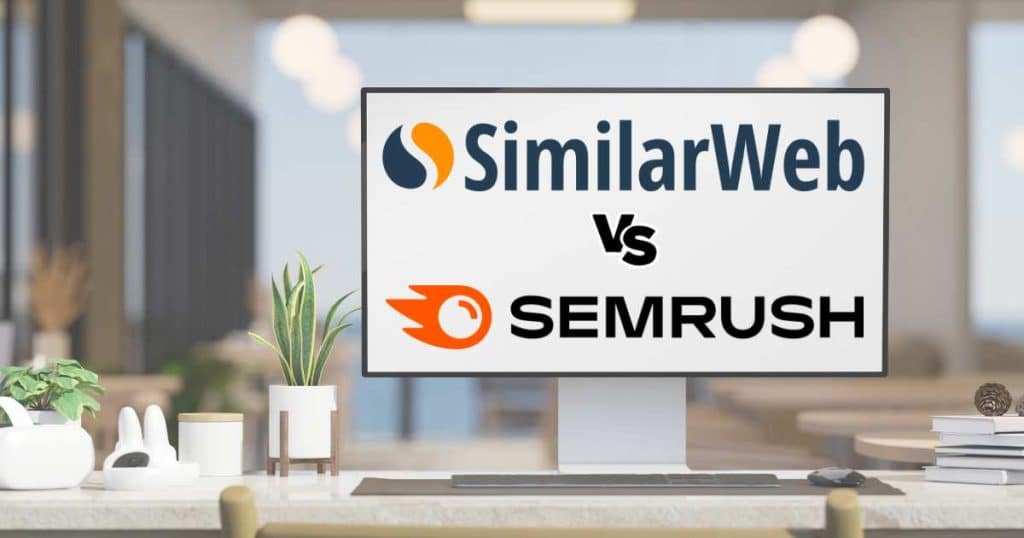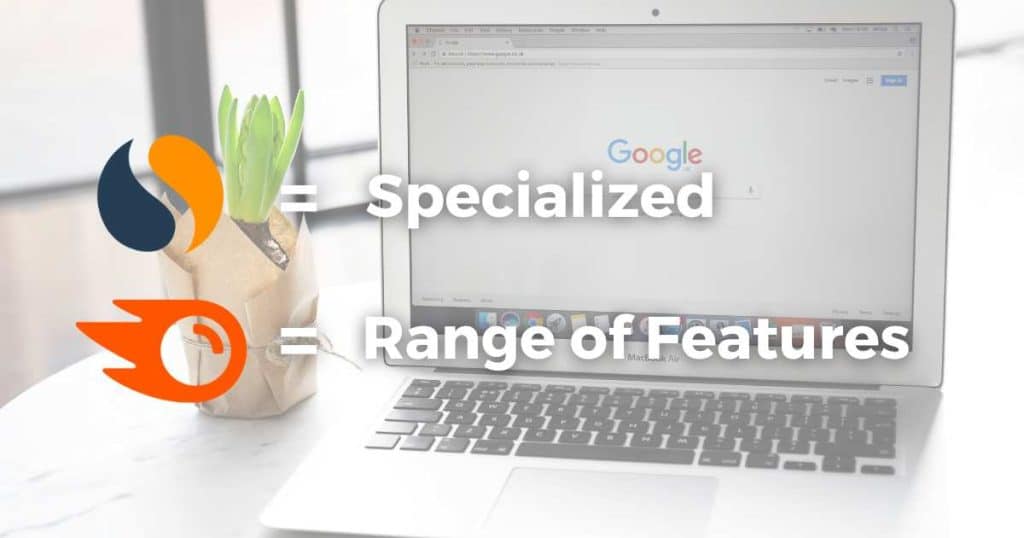Have you narrowed your digital marketing tool search to Similarweb vs SEMrush and need help deciding which to go for?
If you’re reading this article, you likely already know the importance of online marketing.
The good news is that Similarweb and SEMrush can certainly help you take your business to the next level online!
So, which is best for you? And is there one that trumps the other?
Let’s dive in and find out.
Read more: My Top Recommended Online Tools For Small Business.
Quick Summary
- Similarweb focuses on traffic, competitor analysis, and pure statistics. In contrast, SEMrush is an all-in-one digital marketing platform that focuses on SEO, content marketing, and social media marketing.
- SEMrush is the ultimate solution for businesses after a total SEO and marketing toolkit.
- If SEO isn’t your main priority and your focus is audience behavior, competitive analysis, and site traffic, Similarweb may be best for you.
Similarweb vs SEMrush 2025

I’ve tested out both tools myself to give you my honest opinion on which is the best online tool for you and your brand.
So, without further ado, let’s dive into the epic showdown between two industry-leading digital marketing tools: Similarweb vs SEMrush.
In this blog post, we’ll explore each platform’s exciting features, functionalities, and benefits to help you determine which is the ultimate champion.
So, buckle up and prepare for the ultimate battle of Similarweb vs SEMrush!
Read more: Keyword Everywhere Alternatives.
What Are They? Similarweb vs SEMrush
Similarweb and SEMrush are two powerful tools that offer valuable insights and data to help you optimize your online presence.
In a nutshell, Similarweb provides traffic analysis, competitor benchmarking, and market research.
With Similarweb, you’ll be geared to comprehensively understand your audience, identify trends, and make data-driven decisions to build your brand online.
SEMrush is a complete digital marketing toolkit with a range of features, including keyword research, backlinks, content marketing, competitive analysis, and more.
The goal? To help optimize your SEO strategies, track rankings, and drive more traffic to your website.
Whether you’re aiming to boost organic traffic, improve search engine rankings, or stay ahead of the competition, Similarweb and SEMrush have the tools you need to succeed!
So, what are the differences between Similarweb vs SEMrush?
What Are The Differences Between Similarweb vs SEMrush?

While Similarweb and SEMrush offer valuable insights and tools for your online success, there are key differences between the two platforms.
The main difference? SEMrush provides a broader range of functionalities, whereas Similarweb is more specialized.
Similarweb specializes in the statistics of your website, focusing on understanding audience behavior and industry trends.
By using Similarweb, you can keep an eye on both your and your competitors’ websites through digital marketing, digital research, and smart digital intelligence tools.
SEMrush, on the other hand, focuses on a range of dynamic SEO tools to help with keyword research, backlink auditing, and search ranking performance.
Additionally, SEMrush offers a suite of tools for content marketing, social media management, and advertising analysis.
So, with that said, let’s dive into the nitty gritty of both platforms and find out which is a match made in heaven for you and your business!
Read more: SEMrush vs Moz.
Ease Of Use
Both SEMrush and Similarweb offer user-friendly interfaces and intuitive features, making them accessible to both beginners and experienced online marketing gurus.
SEMrush provides a clean and organized dashboard, allowing you to navigate its extensive toolkit easily, and even offers clear instructions and tooltips for new users.
However! Although designed for beginners, SEMrush could make improvements in terms of intuitiveness and navigation (due to the vast array of potentially overwhelming features).
Similarweb boasts a user-friendly interface with a straightforward layout, making it easy for users to access and analyze data.
It’s worth mentioning that both platforms offer comprehensive tutorials and resources to give you a helping hand when you need it.
Winner = Similarweb.
Read more: SpyFu vs SEMrush
Pricing
Similarweb:
- Starter: $125 per month per user.
- Professional: $333 per month per user.
- Team: Starting from $15,000 per year.
- Enterprise: Custom price.
You can also add special Sales Intelligence, Search Intelligence, and Market Intelligence ‘add-ons’ at an additional cost.
All plans also come with a 7-day trial period.
SEMrush:
SEMrush follows a simple 3-tiered pricing structure as follows:
- Pro plan: 119.95 per month.
- Guru plan: 229.95 per month.
- Business plan: 449.95 per month.
It’s another $45 per month for each user added to your account.
Although there’s no free plan with SEMrush, you can test what SEMrush offers by redeeming my SEMrush coupon code, giving you a free 14-day SEMrush trial.
Click here to find out more about how to use my SEMrush coupon code.
Winner = SEMrush.
Similarweb vs SEMrush Key Features

Keyword Research
SEMrush offers an impressive Keyword Overview report that provides a wealth of information for in-depth keyword analysis, including:
- Global and country-specific volume.
- Keyword difficulty.
- Search intent.
- Semantically related keywords.
Plus, their Keyword Magic Tool (where you can identify keywords you want to rank for) stands out with its helpful search filters, streamlining the keyword research process.
With a database boasting over 25 billion keywords, you can be sure to find what you’re looking for!
On the other hand, although easy to use, Similarweb’s dashboard makes it slightly more challenging to analyze keywords efficiently.
Their Keyword Overview report lacks essential features like SERP and competitor keyword analysis, which are crucial for comprehensive keyword research.
However, Similarweb’s ability to research keywords for multiple marketplaces and search engines like Google, Amazon, and YouTube has the cutting edge over SEMrush.
In saying this, this feature is limited in terms of choosing specific countries or time frames, and the lack of filtering options makes it difficult to handle long keyword lists.
However, SEMrush remains a standout with its clean user interface (UI) and comprehensive toolkit for keyword research.
SEMrush goes beyond just SEO and includes PPC data in its keyword overview report, making it more suitable for thorough keyword research.
Winner = SEMrush.
Read more about SEMrush’s keyword research features here.
Traffic Analysis
SEMrush’s Traffic Analytics Feature lets you grab detailed traffic information for your website and your top competitors’ websites.
Here, you can check out Audience Insights, Traffic Journeys, Geo-distributions, Subdomains, Top Pages, and Bulk Analysis data for any website.
Additionally, under the ‘Audience’ tab, you’ll find in-depth information about traffic audience, including geographical data, demographics, and interests.
However, Similarweb slightly edges out as the winner here due to its user-friendly interface and in-depth analysis of website traffic and audience.
While SEMrush provides robust traffic analytics, Similarweb’s focus on website and competitor analysis gives it a slight advantage.
This makes sense, as Similarweb is not exclusively designed for SEO purposes but focuses more on website and competitor analysis, which is why it wins this round!
Winner = Similarweb.
Read more: What Is SEMrush? Breakdown For Beginners.
On-page SEO

I’ll cut to the chase with this one: SEMrush outshines SimilarWeb in the realm of on-page SEO (you may have heard this phrase as on-site SEO or technical SEO).
But this should come as no surprise, considering SEMrush is primarily a tool specifically designed for SEO.
A standout feature of SEMrush is its site audit functionality, which scans your website to help identify any on-page SEO issues (and then provides you with suggestions to fix them!)
Similarweb lacks the comprehensive range of on-site SEO features that SEMrush offers.
For example, SEMrush’s smart on-page SEO checker can scan landing pages and identify the presence of keywords in critical areas such as meta tags and title tags.
Based on the scan results, SEMrush generates technical SEO optimizations, user experience enhancements, or semantic keyword ideas to improve the on-page SEO.
SimilarWeb simply doesn’t provide the functionality that SEMrush’s range of advanced on-page SEO features (such as the Log File Analyzer and Markup Report Generator) can.
Winner = SEMrush.
Read more: Is Google Sites Good For SEO?
Backlinks
Backlinks play a crucial role in website rankings. In fact, did you know that Google actually considers them as one of the top factors?
As a result, link building has become a prevalent off-page SEO strategy you need to get involved with. So, how do Similarweb and SEMrush stack up?
For starters, SEMrush offers various features dedicated to backlink analysis and outreach. You can:
- Easily check the number of referring domains and backlinks.
- Identify toxic elements within your backlink profile.
- Discover new link-building opportunities within your niche.
- Monitor the number of backlinks and referring domains.
The daily backlink updates provided by SEMrush are great, as they allow you to view up-to-date acquired backlinks in an easily accessible report.
Overall, I believe SEMrush combines all the necessary data for backlink profile analysis into one comprehensive report and is what I personally use for my backlink research.
In contrast, Similarweb doesn’t provide backlink analytics or link-building tools.
And as a result, you won’t be able to access competitor backlink information as part of your competitor analysis strategy. Therefore, this one is a no-brainer!
Winner = SEMrush.
Read more: Is SEMrush Worth It?
Competitor Analysis

Similarweb is known for its digital intelligence approach to competitive analysis, with a strong focus on user engagement across various channels.
Comparing results between competitors allows you to determine their share of traffic for each keyword, which can then be filtered by geography, keyword, and search type.
Additionally, Similarweb can track trending keywords and the most popular content on any site, so you can create relevant content (and attract new customers – yay!)
But it doesn’t stop there! Monitoring paid search and advertisement campaigns for engagement metrics like bounce rates, session duration, and pages per visit is also possible.
With Similarweb, get ready to dive deep into your competitors’ PPC, SEO, affiliate, and marketing strategies – all on one platform.
SEMrush is also invaluable for competitor analysis, providing comprehensive insights into your competitors’ top organic keywords, market share, and advertisement strategies.
By identifying the most profitable keywords and analyzing link-building and marketing tactics, SEMrush allows you to improve your own campaigns, resulting in increased page visits!
Additionally, analyzing competitors’ keywords and backlink gaps allows for discovering new possibilities and opportunities.
Creating original content with rankable keywords and acquiring backlinks from relevant sources can boost revenue – which is what all businesses are after, right?
Winner = Similarweb.
Read more: How To Get SEMrush For Free?
Advertising Campaign Management
I have good news for you! Both SEMrush and Similarweb can help you manage campaigns, monitor your competitors’ ad strategies, and evaluate the effectiveness of campaigns.
Additionally, both platforms allow you to identify keyword gaps and determine ad budgets and semantically linked keywords.
Similarweb is the winner when it comes to creating and managing display ad campaigns, but SEMrush’s comprehensive PPC campaign tools are better.
So, who wins this round? Well, I believe there is no outright winner here. Both platforms offer unique strengths and valuable tools for managing advertising campaigns.
Winner = Draw.
Read more: How Often Does SEMrush Update?
Social Media Management
SEMrush offers a comprehensive Social Media Marketing Toolkit (available on all plans) that includes:
- A social media tracker to monitor performance.
- A poster to schedule and publish posts.
- Advertising features to optimize social media ad campaigns.
You can connect up to 7 of your favorite social media profiles, including Facebook, LinkedIn, Twitter, Google Business Profile, Pinterest, and YouTube.
This dynamic built-in tool can schedule posts to multiple channels and manage engagements within those channels, schedule or send posts immediately, set up regular postings, add posts to a queue, or save posts as drafts.
In contrast, Similarweb doesn’t offer a social media management tool; however, you can spy on your competitors’ social media accounts.
Winner = SEMrush.
Read more: Later Social Media Management Review.
Similarweb vs SEMrush Who Are They Best For?

Choosing between SEMrush and Similarweb can be challenging as they both have their own individual strengths and weaknesses.
So, after all that said, which should you pick? Let me break it down for you.
If you’re looking for a complete SEO tool and require content marketing, social media marketing, and customer relations management, the choice is easy – go with SEMrush.
SEMrush can handle most of your website management needs, and even beginners can get up and running quickly!
If you specifically want help with statistics, insights on traffic sources, audience interests, page rankings, and competitor traffic analysis, Similarweb might be the better choice.
Read more: 10 Advantages of Semrush
Stew’s Final Thoughts
That brings me to the end of this comprehensive Similarweb vs SEMrush comparison guide!
Personally, I think SEMrush is the clear winner. In fact, I use SEMrush every week for my keyword research, competitor analysis, and backlink-building strategies.
Considering SEMrush and Similarweb cost about the same, SEMrush offers better value for money, a wider range of features, and the ability to be used by an entire marketing team.
I honestly can’t rave about SEMrush enough, and I believe it’s one of the best investments you can make to help grow your brand.
What do you think? Do you agree with me, or do you prefer Similarweb?

